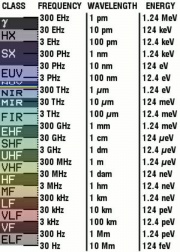Difference between revisions of "Electromagnetic radiation"
(username removed) |
|||
| Line 2: | Line 2: | ||
== Description == | == Description == | ||
| − | The entire spectrum of radiant energy or light. Electromagnetic radiation travels though space at the speed of light in the form of photons. Each photon is characterized by its specific frequency and wavelength. The highest energy photons have the shortest wavelengths. Some groups of electromagnetic radiation are (from high energy to low energy): cosmic rays, [ | + | The entire spectrum of radiant energy or light. Electromagnetic radiation travels though space at the speed of light in the form of photons. Each photon is characterized by its specific frequency and wavelength. The highest energy photons have the shortest wavelengths. Some groups of electromagnetic radiation are (from high energy to low energy): cosmic rays, [[gamma radiation|gamma rays]], [[x-ray|x-rays]], [[ultraviolet radiation]], [[visible radiation]], [[infrared radiation]], [[microwave|microwaves]], and [[radio frequency|radio waves]]. The effects of radiation are measured in terms of its quality (wavelength distribution), quantity (intensity or energy) and duration (time). |
== Synonyms and Related Terms == | == Synonyms and Related Terms == | ||
Revision as of 19:49, 14 January 2014
Description
The entire spectrum of radiant energy or light. Electromagnetic radiation travels though space at the speed of light in the form of photons. Each photon is characterized by its specific frequency and wavelength. The highest energy photons have the shortest wavelengths. Some groups of electromagnetic radiation are (from high energy to low energy): cosmic rays, gamma rays, x-rays, Ultraviolet radiation, Visible radiation, Infrared radiation, microwaves, and radio waves. The effects of radiation are measured in terms of its quality (wavelength distribution), quantity (intensity or energy) and duration (time).
Synonyms and Related Terms
electromagnetic spectrum; EMS; electromagnetic energy; electromagnetic waves; radiation; light; elektromagnetisk stråling (Dan., Nor.); Elektromagnetische Wellen (Deut.); radiación electromagnética (Esp.); rayonnement électromagnétique (Fr.); elektromagnetische straling (Ned.); Radiação electromagnética (Port.); elektromagnetisk strålning (Sven.)
Authority
- Richard S. Lewis, Hawley's Condensed Chemical Dictionary, Van Nostrand Reinhold, New York, 10th ed., 1993
- Encyclopedia Britannica, http://www.britannica.com Comment: "Electromagnetic Radiation." Encyclopædia Britannica. 19 Aug. 2004 .
- Thomas B. Brill, Light Its Interaction with Art and Antiquities, Plenum Press, New York City, 1980
- Wikipedia, the free encyclopedia, at http://www.wikipedia.com Comment: http://en.wikipedia.org/wiki/Electromagnetic_radiation (Accessed Sept. 20, 2005)
- The American Heritage Dictionary or Encarta, via Microsoft Bookshelf 98, Microsoft Corp., 1998
- Art and Architecture Thesaurus Online, http://www.getty.edu/research/tools/vocabulary/aat/, J. Paul Getty Trust, Los Angeles, 2000
